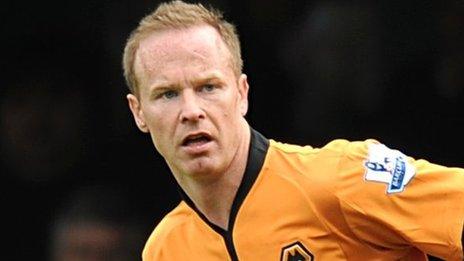Ex-footballer Jody Craddock finds new identity as artist
- Published
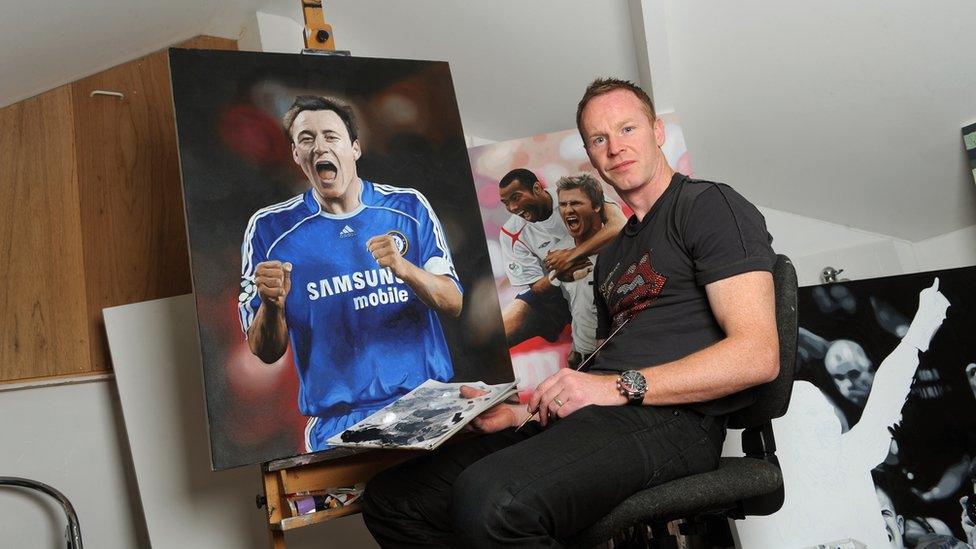
One of Jody Craddock's biggest commissioned works was a painting of Chelsea and then England captain John Terry, who drove to Craddock's home in the Midlands to collect it
Artist Jody Craddock is beginning to make a name for himself in the world of painting. But however successful he becomes, it is debatable whether he will ever be better known than he was during his long football career with Sunderland and Wolverhampton Wanderers. So when his contemporaries were moving into punditry or football management, how did this centre-half become an artist?
"I could play football and I could paint," jokes Jody Craddock. "It's all I could do."
Former England captains David Beckham and John Terry - the portrait of the Chelsea defender being commissioned by the player himself - have been star subjects for Craddock's brush, along with many other team-mates and opponents.
Craddock has also painted his old boss - the former Wolves owner Sir Jack Hayward, who died earlier this year - and the massive portrait still hangs in the main corridors of power at Molineux stadium.
So football loomed large in his art but when he launches a first "serious" exhibition of his painting in the Midlands, just north of the M1/M6 interchange this weekend, the 40-year-old former professional footballer will be heading off in a new career direction.
When he retired from football in May 2013, it was an obvious career move for Craddock to then go and concentrate on what had already been a lucrative sideline in the latter years of his playing days. Yet he is about to show he has moved on from his football days by painting things other than footballers - a new set of pictures he hopes will establish for him "a new identity as an artist".
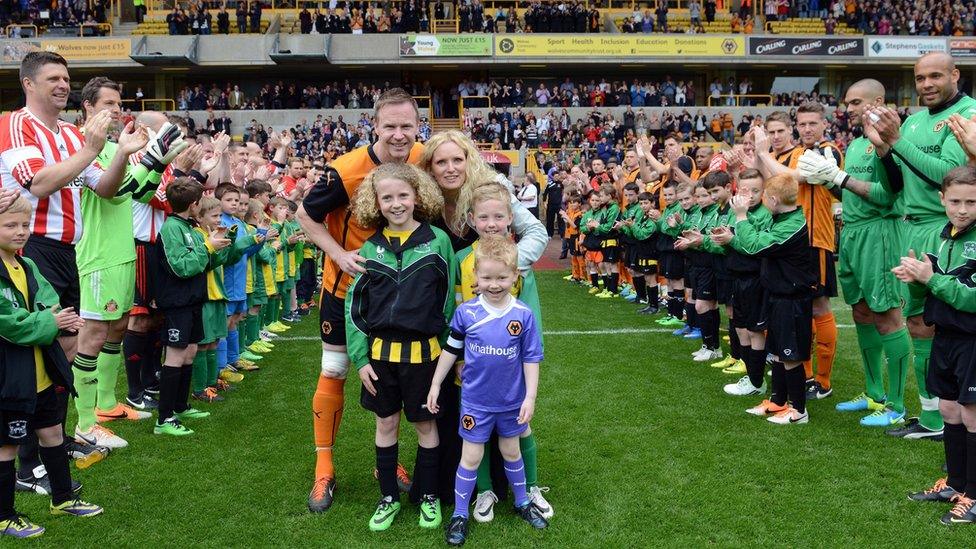
Jody Craddock is used to drawing crowds - like the 9,000 who turned up to watch his testimonial at Molineux last year. Proceeds from ticket sales were donated to Birmingham Children's Hospital, where Craddock's son Toby received treatment for leukaemia
"I think it's common knowledge that I'm an artist," Craddock told BBC WM. "That's what I naturally went into when I retired from football. But I've been working on a new identity, which I've kept under wraps for the last year.
"I'd done portraiture for years. When I retired I then experimented with graffiti and photo realism. But I needed something that can be taken seriously, that looks good and that people will look at and recognise.
"There's a not a lot out there that has not already been done, so to think of something original and different was hard."
But old habits die hard, evidently, and Craddock has not moved on so far from his football days that he cannot pay some homage to his former profession. When he launches his collection - Le Bellezza Della Fusione - this weekend, at the Antidote Art Gallery in Lutterworth, Leicestershire, it will be at the traditional football kick-off time of 15:00 on a Saturday - and the event will last for two hours, coming to an end about the same time as the final whistle blows on the afternoon's fixtures.

Former footballers and their unorthodox careers
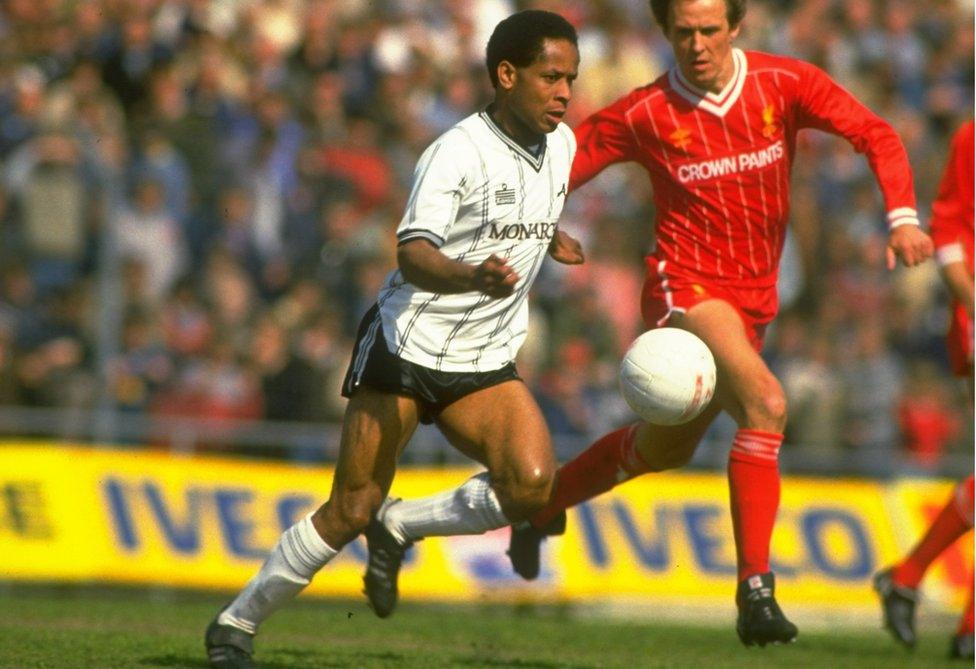
England's 1966 World Cup-winning left back Ray Wilson became an undertaker after retiring from football
Former Wigan and Portsmouth defender Arjan de Zeeuw is now a detective in his native Netherlands - and has captained the Dutch national police football team
John Chiedozie (pictured above), who played on the wing for Orient, Notts County and Tottenham in the 1970s and 80s, ran his own company hiring out bouncy castles for parties
Former Middlesbrough and Blackburn winger Stuart Ripley became a solicitor and has worked largely on sports issues, external
Paul McGregor, who played as a striker for Nottingham Forest in the 1990s, was the singer in a band called Merc during his playing days and went on to front post-punk band Ulterior
Francis Lee (below), who played up front for England in the 1970 World Cup and won the league with both Manchester City and Derby County, made his post-football fortune as a toilet paper magnate
Vinnie Jones, Eric Cantona and Frank Leboeuf all played in the Premier League in the 1990s before moving into acting
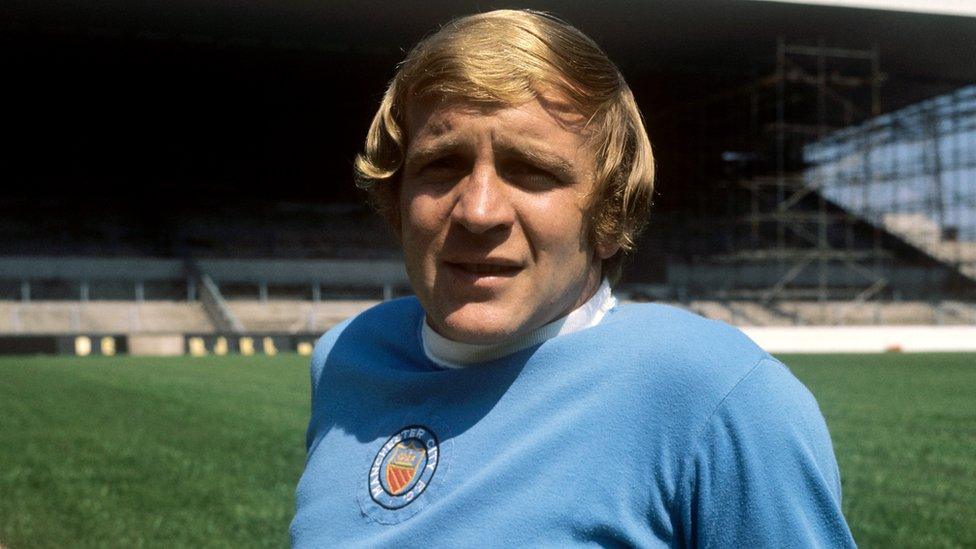

Craddock began his professional football career with Cambridge United 22 years ago.
"It was always football, football," he said. "I had done A-level art at school and scraped through but hadn't really been thinking about it as a career. Art was just a little hobby. Some days off I played golf, some days I painted a picture.
"When I was at Sunderland I didn't have a studio. I just sat in the lounge and worked on a painting there. But I just got better and better.
"I was visited one day by a friend of mine, Paul Kerr, who used to play for Middlesbrough and had become a financial advisor. He said 'You should do something with this'.
"That lit the fire and it's burned slowly for the last 15 years, to the point where I'm now an artist."
Jody Craddock - Footballer and Artist
581
Professional matches
24
Goals
-
Art A-level
-
12 Paintings in his new exhibition
-
2 England captains painted
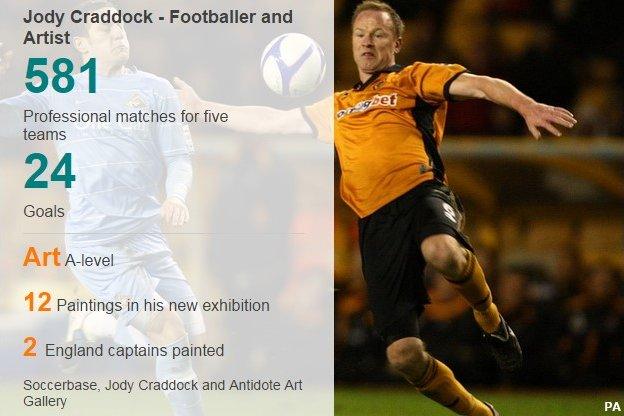
The eight paintings he will have on show at the gallery this weekend are the product of the big decision he had to make when his footballing career was over.
Craddock was a married father of three living in the small village of Cookley in Worcestershire when he retired in 2013.
Having studied for a diploma in sports psychology and fitness and nutrition when he was a teenager and then taken a coaching course as his playing days came to an end, he did have the option of remaining in the game.
"I had taken my professional B licence and I did have to make that decision," he said. "Did I go into coaching? Or do I go with my heart and do what I really wanted to?"
And, although he now has what he admits is the "far less stressful" job of persuading people to sell his paintings rather than facing opposition strikers trying to sell him dummies, he is convinced that letting his heart rule his head was the right decision.
"It's not just about being pleased with you what you've done," he said. "You've then got impose it on to a gallery and then persuade people to part with their hard-earned money to buy the paintings.
"But it's not about money. I've done well out of football. For me, it's simply about wanting to have my paintings hanging on people's walls.
"I just want people to love my work, to feel like I've produced something that people can see 'that's what Jody Craddock can do'."
"In another 10 or 15 years, I'll still be an artist," he smiles. "And, by then, people will have forgotten I was a footballer."
- Published6 May 2014
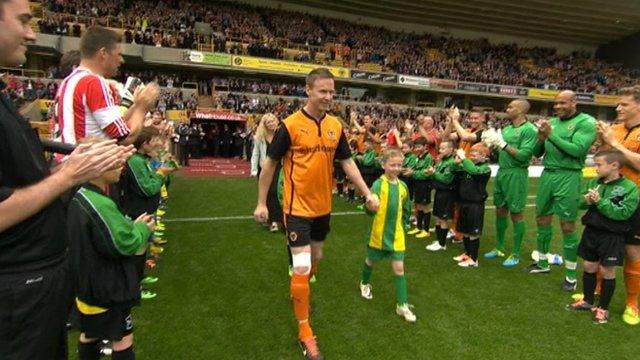
- Published30 April 2014
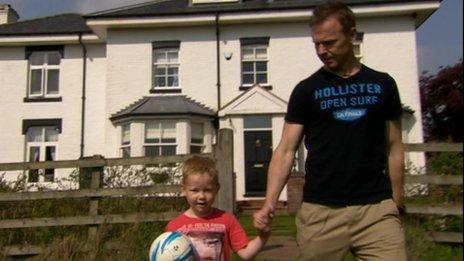
- Attribution
- Published17 May 2013
